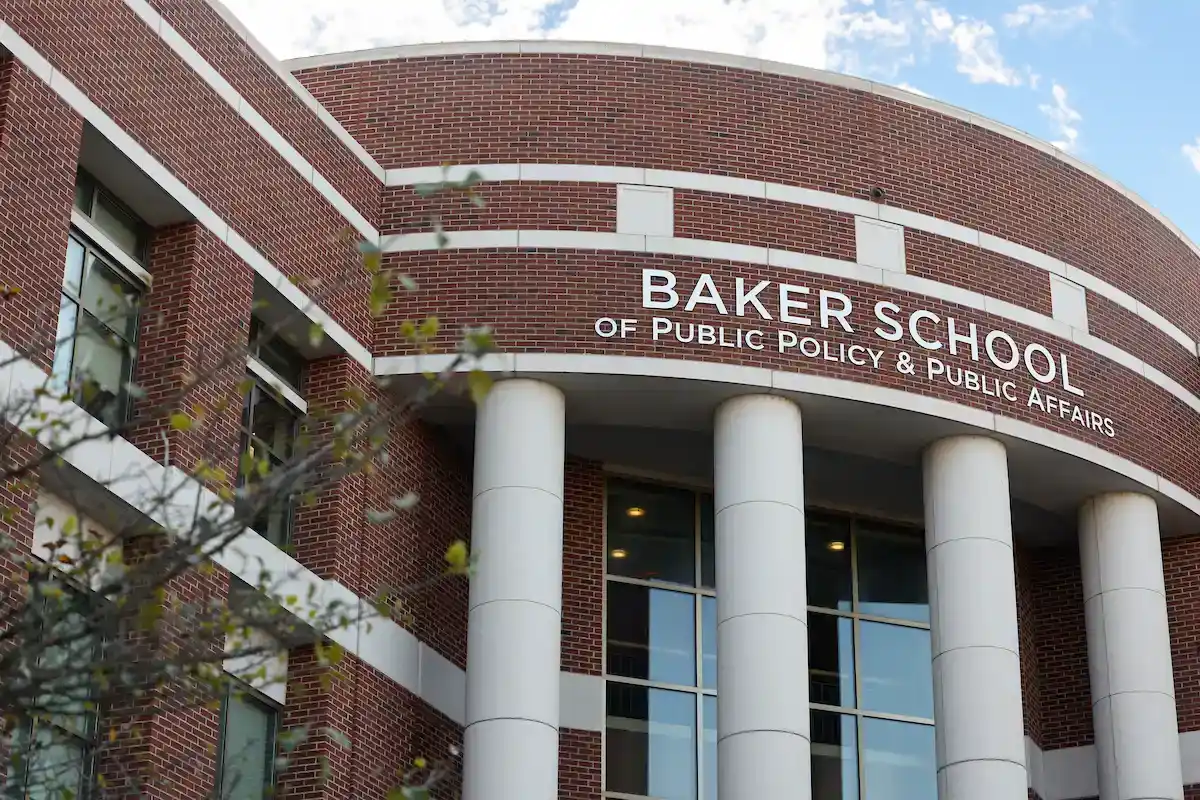Public Affairs Major


Public Affairs Major
The Bachelors of Science in Public Affairs (BSPAF) is a degree program designed to teach students the art and science of public problem solving. The Public Affairs degree prepares students for careers as elected officials, leading civic-minded organizations, or in a variety of policy fields, including law, energy, health, national security, and the environment.
What the Baker School Can Offer You
Howard Baker, the Huntsville, Tenn. native, Senate Majority Leader, White House chief of staff and U.S. ambassador to Japan, is our model. Honoring his legacy we teach students to rise above “politics as usual” to effect change.
Concentrations
Requirements and Curriculum for the Public Affairs major
Beyond prerequisites and volunteer core requirements, the major consists of 45 hours, which includes 30 hours of core classes, a minimum of 3 hours in professional development, and 12 hours in one of the following concentrations:
Agricultural Policy
Description forthcoming.
Courses
- AREC 313 Agricultural Law
- AREC 331 Agricultural Commodity Policy
- AREC 332 Food Policy
- AREC 350 The Food and Agricultural Marketing System
Economic and Community Development
A partnership with the Department of Economics, the Economic and Community Development concentration provides students with the tools to evaluate decisions by local, state, and federal governments in managing economic growth and in providing goods and services for the public interest. Students are well-equipped to work at the intersection of public policy and private industry, helping make public policy more effective and individuals and private entities more successful.
Courses
- ECON 311 Intermediate Microeconomics
- HBS 461 Tools for Economic Development
- ECON 471 Public Finance: Expenditure Analysis
- ECON 472 Taxation and Fiscal Federalism
Potential Career Options
- Policy Analyst
- Chamber of Commerce Representative
- Housing Analyst
- Real Estate Analyst
- Budget Analyst
- Government Relations Manager
Energy Policy
Energy Policy Concentration students are prepared to evaluate the strategies and tradeoffs in energy policy decisions and to understand their impacts. Students are grounded in Baker core coursework on government, economics, and public policy, while the concentration combines the technologies, markets, economics, and real-world considerations of energy policy decisions. Students are prepared to assess how energy policies will impact the environment, energy reliability, energy costs, and various stakeholders in the policy process.
Courses
- GEOG 346 Energy, Governance, and Sustainability
- ECON 362 Environmental and Natural Resource Policy
- HBS 424 Energy Markets and Economics
- HBS 443 Energy Transitions
Potential Career Options
- Energy Policy Advisor
- Government Relations Manager
- Energy Policy Analyst
- Budget Analyst
- Program Manager
Environmental Policy
Managing natural resources and the environment in a world of economic growth is a complex challenge. This concentration combines expertise from the Departments of Geography, Economics, and Agricultural and Resource Economics to provide students with a comprehensive understanding of the environmental and sustainability considerations in managing land, transportation, population, energy, and other aspects of economic development.
Courses
- AREC 314 Environmental Law
- AREC 470 Policy Analysis for Environmental and Natural Resource Management
- ECON 362 Environmental and Natural Resource Policy
- GEOG 443 Sustainable Cities and Landscapes
Prerequisite
- GEOG 206 Sustainability Principles and Practices
Potential Career Options
- Policy Advisor
- Government Relations Manager
- Environmental Policy Analyst
- Sustainability Research Associate
- Budget Analyst, Program Manager
- Sustainability Coordinator
Academic Programs to Consider Pairing
- Agricultural Leadership
- Animal Science
- Data Science
- Economics
- Entomology and Plant Pathology
- Environmental and Soil Sciences
- Environmental Studies
- Forestry
- Geographic Information Science
- Geology
- International Agriculture and Natural Resources
- Natural Resource and Environmental Economics
- Plant Sciences
- Statistics
- Sustainability
- Wildlife and Fisheries Science
Government Relations
Students in the Government Relations concentration are prepared to serve as liaisons between government and private businesses or between government and the nonprofit sector. The coursework emphasizes persuasion, crisis communication, and media. This concentration is a collaboration with the College of Communication and Information.
Courses
- CMST 342 Survey of Organizational Communication
- JMED 366 Media and Democracy
- PBRL 430 Crisis Communication
- CMST 449 Political Persuasion
Prerequisite
- CMST 201 Introduction to Communications Studies
Potential Career Options
- Government Relations Manager
- Public Affairs Specialist
- Lobbyist
- Advocacy Manager
- External Affairs Specialist
- Government Affairs Specialist
Academic Programs to Consider Pairing
Health Policy
Students in the Health Policy concentration learn about the key issues, institutions, and actors in America’s healthcare system and provides a toolkit for evaluating the system’s performance and efficiency. This concentration prepares students to work in health policy within the public sector, for nonprofits seeking to affect health policy, or for healthcare companies in the private sector. This concentration is a collaboration with the Haslam College of Business and the College of Education, Health, and Human Sciences.
Courses
- ECON 311 Intermediate Microeconomics
- PUBH 400 Comparative Health Systems
- PUBH 420 Environmental Public Health
- ECON 436 Economics of Health and Health Care
Prerequisite
- PUBH 201 Introduction to Public Health
Potential Career Options
- Health Policy Advisor
- Government Relations Manager
- Health Policy Analyst
- Budget Analyst
- Healthcare Entrepreneur
- Program Manager
- Hospital Administrator
Academic Programs to Consider Pairing
Law and Policy
A partnership with the College of Law, this concentration gives students the opportunity to explore the intersection of public policy and law, with a focus on the American legal system. Students in this concentration have a chance to experience courses similar to those in a standard law graduate curriculum, giving them an early indicator on their aptitude for a career in law.
Courses
- IAC 302 American Legal System
- IAC 303 Legal Research and Writing
- IAC 404 Crime, Law, and Justice
- IAC 405 Civil Law and Justice
Potential Career Options
- Attorney
- Prosecutor
- Public Defender
- General Counsel
- Law Enforcement Agent
- Criminal Justice Specialist
- Regulator, Judge
- Elected Public Official
- Judicial Advocate
Academic Programs to Consider Pairing
National Security
The National Security concentration focuses on policy decisions surrounding U.S. national security and foreign policy. Students examine the role of the United States in the world through various lenses and can evaluate the impact of national security policy decisions and strategies on domestic priorities and global affairs.
Courses
- POLS 366 United States Foreign Policy Process
- PHIL 441 Global Justice and Human Rights
- IAC 413 The Military in American Democracy
- HBS 452 U.S. National Security
Potential Career Options
- National Security Analyst
- Foreign Service Officer
- Intelligence Operative
- Intelligence Analyst
- Data Analyst
- Policy Analyst
- Legislative Coordinator
- Research Associate
Academic Programs to Consider Pairing
Nuclear Policy
The Nuclear Policy concentration focuses on policy decisions surrounding nuclear security, deterrence, and nonproliferation. Students examine the role of nuclear weapons and nuclear materials in national security policy decisions and strategies and the prevention and causes of armed conflict.
Courses
- HBS 452 U.S. National Security
- HBS 454 Nuclear Security
- HBS 455 Nuclear Weapons
- HBS 456 Nuclear Policy and Deterrence
Potential Career Options
- National Security Analyst
- Nuclear Lab Researcher
- Customs Officer
- Foreign Service Officer
- Arms Control Negotiator
- Intelligence Operative/Analyst
- Data Analyst
- Defense Contractor
- Lawyer
- Project Manager
- Military Officer
- Policy Analyst
- Research Associate
Academic Programs to Consider Pairing
Policy Analytics
Policy Analytics Students learn how to use data to provide insights and solutions to public problems. With intense additional training in economics and in data analysis and visualization, these students are prepared to analyze public policy problems using cutting edge techniques and to communicate their insights to a broad audience.
Courses
- ECON 311 Intermediate Microeconomics
- ECON 381 Introduction to Econometrics
- HBS 481 Policy Lab I
- HBS 482 Policy Lab II
Prerequisite
One of the following:
- MATH 125 Basic Calculus
- MATH 141 Calculus I
- MATH 142 Calculus II
Potential Career Options
- Data Analyst
- Policy Analyst
- Legislative Coordinator
- Research Associate
Political Communication
This concentration, which is a collaboration with the College of Communication and Information, is for students interested in the communications side of public policy. Grounded in the Baker School core curriculum on economics, politics, public policy, and civics, political communication concentration students are prepared to communicate policy decisions, political positions, or to drive campaigns for public office.
Courses
- JMED 200 Multimedia Writing
- CMST 342 Survey of Organizational Communication
- PBRL 400 Ethical and Legal Issues in Public Relations
- CMST 449 Political Persuasion
Prerequisite
- CMST 201 Introduction to Communications Studies
Potential Career Options
- Campaign Manager
- Policy Advisor
- Policy Communications Manager
- Data Visualization Manager
- Public Relations Specialist
- Political Media Relations
Academic Programs to Consider Pairing
Public Management
With a toolkit consisting of financial, accounting, and human resources management, along with coursework on navigating difference in the workplace, this concentration prepares students to take leadership roles in public organizations or in nonprofit organizations. Students leave this set of courses prepared to lead effective and efficient governmental and nonprofit organizations. This concentration is in partnership with the Haslam College of Business.
Courses
- ACT 200 Foundations of Accounting
- FINC 300 Fundamentals of Finance
- HBS 434 Public Organization, Theory, and Behavior
- HBS 435 Leading Across Difference
Prerequisite
- MGT 201 Introduction to Business Management for Non-Majors
Potential Career Options
- City Manager
- Nonprofit Leader
- Budget Analyst
- Program Manager
- Public Finance Analyst
- Economic Development Manager.